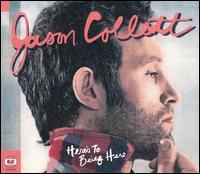
Jason Collett
Here's to Being Here (2008)
Jesse Raub
Too often i find myself wondering who's playing backups on albums these days. Solo releases are splattered with guest performances, auxiliary musicians, extra instrumentation, etc. al. While it's nice to know who's playing what and demonstrates humility on the part of the artist, I miss the the egocentric days of the singer/songwriter era. Do you have any idea who played drums on Neil Young's self-titled album? How about the bass player on Bob Dylan's Highway 61 Revisited? Saxophone for Tom Waits' Nighthawks at the Diner? Whatever the musician didn't play was flushed out by friends and studio musicians well-accomplished in their own right. Did you know that was James Taylor and Linda Ronstadt singing the harmonies on "Old Man"? How about the fact that Al Kooper was the one who wrote and played the classic organ part for "Like a Rolling Stone"?
Oh, that's right, you didn't give a shit because it was the Neil and Bob show, respectively. In the same right, Jason Collett has captivated my interest with his third proper full-length in six years. As a member of Broken Social Scene he contributed, well, something I guess. But who cares? Collett has strapped on the cap of the egocentric singer/songwriter, and his album has benefited immensely for it.
Queuing up a Dylan-esque delivery with his smokey affected drawl and conjuring up the immediacy and grandiose arrangements of Springsteen, Collett's solo work has tipped its hat quite generously to the work of the late `60s and `70s-era musician. The early rock 'n' roll vibe to the opening piano riff of "Sorry Lori" proceeds to smartly played muted bass notes and mewing electric guitar parts. The southern rock riff of "Out of Time" builds to a dance-style drum beat on the chorus. The lazy `70s rock of "Papercut Hearts" drives it's four-four beat right into your big, swelling, nostalgic liver.
And while Jason conjures up more comparisons to bands of the old era, he's representing the forefront of the New Canadian Americana Revival. While the music is undoubtedly roots rock in origins, the themes are distinctly Canadian. "Charlyn, Angel of Kensington" features a latin rhythm and muted reggae tones to the bass and palm-muted guitar licks, representing the same multi-cultural area of Kensington Heights, Toronto that Constantines have named their new album after. The amazingly crafted "No Redemption Song" calls up Woody Guthrie acoustic pickin' while referencing strolling down highways in various Canadian cities and provinces. The song flirts with country music, featuring a banjo, yodel-worthy backing harmonies, and some electric pickin'.
The album suffers mostly from overstepping its own boundaries, adding modern-sounding synth lines and guitar effects to the opening "Roll on Oblivion" or the keyboards that come in during "Out of Time," but those moments are few and far between. Instead, the album focuses on vintage production sounds on the drums, bass and guitars, letting the acoustic play the background and cleverly allowing the electric guitar to fade into and out of ryhthm chords while taking high demand during solo licks and key riffs. The Phil Spector / Born to Run-style piano and bell parts tinkle wonderously behind the dominant electric soloing. The aforementioned riff from "No Redemption Song" comes out strong against an acoustic intro, verse and chorus.
And through the whole album, I couldn't give a fuck who was playing what. Collett's voice dominates the album in full, and there's no doubt that he had his hand in writing and arranging all the tracks on the album. The package presented, thusly, is complete, homogeneous, and succinct. And well worth a listen.